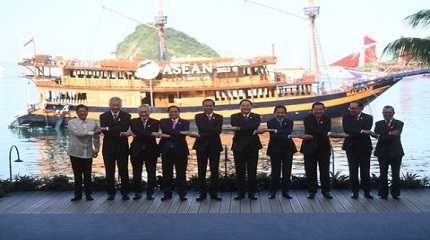
LABUAN BAJO, Indonesia, May 11 (NNN-XINHUA) – The Association of Southeast Asian Nations (ASEAN), demonstrated its confidence in becoming the world’s new economic powerhouse, reflected at a summit held this week in the Indonesian town of Labuan Bajo.
This year’s 42nd ASEAN Summit, under Indonesia’s ASEAN chairmanship, is themed “ASEAN Matters: Epicentrum of Growth.”
“We have a strong asset as the epicentrum of growth, an economy that grows far above average global economic growth, demographic bonus and a maintained regional stability,” Indonesian President, Joko Widodo, said yesterday, at the Summit’s opening session.
In his remarks at the summit, Vietnamese Prime Minister, Pham Minh Chinh, as quoted by Vietnam News Agency, highlighted three core factors to ASEAN’s characteristics: values, vitality and reputation, which have helped the regional bloc maintain independence and strategic self-reliance, turn into a growth epicentre and better adapt to external shocks.
In an Apr report, the Asian Development Bank projected that, the economies in the Asia Pacific would grow 4.8 percent this year and next year, up from 4.2 percent in 2022, noting, growth in the region remains resilient.
Leaders and senior officials engaged in productive bilateral and multilateral meetings. For example, Widodo met with Pham Minh Chinh on Tuesday and discussed joint efforts towards a bilateral trade target of 15 billion U.S. dollars by 2028.
On the same day, leaders from Indonesia and Timor-Leste agreed to form a joint working group for economic development in their border areas. Indonesia proposed immediate talks on a bilateral investment treaty.
“When we talk about ASEAN being the epicentrum of growth, it is related to opportunities,” Indonesian Tourism and Creative Economy Minister, Sandiaga Uno, said, at a press conference yesterday, emphasising opportunities in the sector of electric vehicles (EVs).
Indonesia, the current ASEAN chair, has been on track to promote EV use in the country, and the region, in a new energy transition to reduce emissions.
An outcome document on developing a regional EV ecosystem is expected to be released from the summit, to build ASEAN as a global production hub for the EV industry.
ASEAN has set the target of raising the proportion of renewable energy in its energy mix to 23 percent by 2025, for a low-carbon future.
In his opening remarks, Widodo mentioned the implementation of the Regional Comprehensive Economic Partnership (RCEP), as part of the efforts to reinforce inclusive cooperation for ASEAN in the future.
The trade deal comprises 15 Asia-Pacific countries, including the 10 ASEAN member states, and ASEAN’s five trading partners, namely China, Japan, South Korea, Australia and New Zealand.
According to the World Bank, RCEP, the world’s largest free trade area, covers 2.3 billion people or 30 percent of the world’s population, contributes 25.8 trillion U.S. dollars or about 30 percent of global gross domestic product, and accounts for 12.7 trillion U.S. dollars, or over a quarter of global trade in goods and services.
Noting that China and ASEAN are each other’s largest trading partners, Indonesian tourism minister, Uno, sees “the relationship between ASEAN and China (as) beneficial for the world.”
The International Monetary Fund, said in April’s World Economic Outlook report that, the reopening and growth of China’s economy would likely generate positive spillovers for countries with stronger trade links and reliance on Chinese tourism.
“After China’s reopening of its borders, we are looking to achieve more equitable and more sustainable, with better quality, in terms of trade and investment between ASEAN and China,” Uno said.




